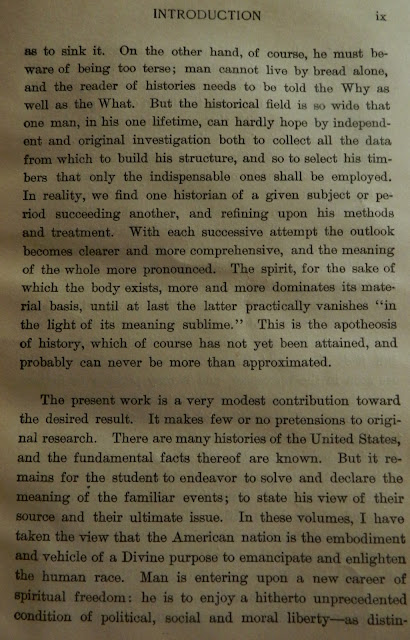Battle of Bunker Hill, 1775. Known as Bunker Hill Day.Under the heading, "June 17: 'Don't Fire Until You See the Whites of Their Eyes'," Bennett (2) tells the bones of the story. British General Thomas Gage awakes in Boston and learns that two hills across the Charles River are "covered with Patriot troops and fortifications." Gage orders General William Howe to take the hills. Howe leads 2000 men with some drums and fifes up Breed's Hill. When the British were fewer than fifteen paces away, the Patriots fire. The British retreat, storm the hill again, and again retreat. The third time they find that the Patriots-- who had run out of ammo!-- were gone. About one-half of the British soldiers lost their lives. Four-hundred forty among the 3200 Patriots died.
The colonists, although defeated, proved that they were able to stand against the British regulars, so morally and historically the conflict was a victory for the united colonies. (1)
Two asides. First, for reason of which I am totally ignorant, the battle took place at Breed's Hill but is called what it's called. Second, on this day in 1825 our old pal the Marquise laid the cornerstone at the Bunker Hill Monument.
Bennett presents this brief history in almost story-like form, not that there's anything wrong with that. But now knowing a little something about this well-connected guy, Joseph Warren who was among the 440 Patriots who died at Bunker Hill, I wondered what part he played. Knowing that names are often lost in the retelling of history, I turned to the oldest
I was not disappointed. Surprised? Maybe. But not disappointed.
 |
| Warren was 34 years old. |
 |
| Immortality. If it weren't for some |
Hawthorne's History of the United States is a three volume set published in 1898. This
In the 12 page introduction in Vol. I Hawthorne discusses history and the recording, interpretation and presentation thereof. A snippet:
 |
| "With each successive attempt, the outlook becomes clearer and more comprehensive, the meaning of the whole more pronounced." "... few or no pretensions to original research." Do tell. |
Well. Yeah. Maybe.
But I'm still left wondering who the heck this Hawthorne guy is. And then, I get it. From Wikipedia.
Julian Hawthorne (June 22, 1846 – July 21, 1934) was an American writer and journalist, the son of novelist Nathaniel Hawthorne and Sophia Peabody. He wrote numerous poems, novels, short stories, mystery/detective fiction, essays, travel books, biographies and histories. As a journalist he reported on the Indian Famine for Cosmopolitan magazine, and the Spanish-American War for the New York Journal.Julian also had some thoughts about incarceration:
In 1908, Hawthorne's old Harvard friend William J. Morton (a physician) invited Hawthorne to join in promoting some newly created mining companies in Ontario, Canada. Hawthorne made his writing and his family name central to the stock-selling campaigns. After complaints from shareholders, both Morton and Hawthorne were tried in New York City for mail fraud, and convicted in 1913.[9] Hawthorne was able to sell some three and a half million shares of stock in a nonexistent silver mine and served one year in the Atlanta Federal Penitentiary.[10]Anywhooo. It's supper time.
Upon his release from prison, he wrote The Subterranean Brotherhood (1914), a nonfiction work calling for an immediate end to incarceration of criminals. Hawthorne argued, based on his own experience, that incarceration was inhumane, and should be replaced by moral suasion. Of the fraud with which he was charged he always maintained his innocence.
REFS
(1) Mary Emogene Hazeltine. Anniversaries and Holidays: A Calendar of Days and How to Observe Them. American Library Association, Chicago. 1928
(2) William J. Bennett and John T.E.. Cribb. The American Patriot's Almanac. Thomas Nelson, Nashville, Dallas, etc. 2008
(3) Julian Hawthorne. United States: From the Landing of Columbus to the Signing of the Peace Protocol with Spain. Peter Fenelon Collier, New York. 1898
No comments:
Post a Comment
Be nice. Nothing inappropriate, please.